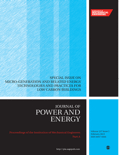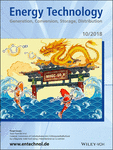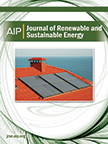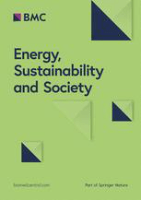
Frontiers in Energy
Scope & Guideline
Leading the Charge in Energy Research and Development.
Introduction
Aims and Scopes
- Renewable Energy Technologies:
The journal explores advancements in renewable energy sources such as solar, wind, and bioenergy, focusing on innovative technologies and methodologies that enhance their efficiency and integration into existing energy systems. - Energy Storage Solutions:
Research on various energy storage technologies, including batteries, supercapacitors, and thermal storage, is a core area, with a focus on improving performance, longevity, and cost-effectiveness. - Electrochemical Energy Systems:
A significant emphasis is placed on electrochemical systems like fuel cells and electrolyzers. The journal publishes studies on the development of new materials, catalysts, and processes that enhance the efficiency of these systems. - Energy Efficiency and Optimization:
Research aimed at optimizing energy use in various sectors, including industrial, residential, and transportation, is a key focus. This includes methodologies for improving system efficiencies and reducing energy consumption. - Environmental Impact and Sustainability:
The journal addresses the environmental aspects of energy systems, including carbon capture and utilization, lifecycle assessments, and sustainable practices in energy production and consumption. - Smart Grids and Energy Systems Integration:
The integration of distributed energy resources and smart grid technologies is explored, focusing on innovative control strategies, demand response, and the role of digital technologies in energy management.
Trending and Emerging
- Hydrogen Production and Utilization:
Research on hydrogen as a clean energy carrier, including production methods (e.g., electrolysis, photocatalysis) and applications in fuel cells, has gained significant traction, driven by the push for decarbonization. - Advanced Materials for Energy Applications:
There is a growing focus on the development of novel materials, such as nanomaterials and metal-organic frameworks, for applications in energy storage, conversion, and catalysis. - Carbon Capture and Utilization Technologies:
Innovations in carbon capture, utilization, and storage (CCUS) technologies are increasingly featured, highlighting efforts to mitigate climate change impacts associated with fossil fuel use. - Digital Technologies in Energy Systems:
The integration of machine learning, artificial intelligence, and big data analytics in optimizing energy systems and enhancing predictive maintenance is an emerging area of research. - Sustainable Bioenergy Solutions:
The exploration of sustainable bioenergy production methods, including waste-to-energy technologies and advanced biofuels, is increasingly relevant in the context of circular economy principles.
Declining or Waning
- Conventional Fossil Fuel Technologies:
Research focused on traditional fossil fuel extraction and utilization technologies has diminished, reflecting a broader shift towards renewable energy and sustainability. - Nuclear Energy Innovations:
There has been a noticeable decline in studies related to new nuclear technologies and safety systems, possibly due to the increased focus on renewable energy sources and public concerns regarding nuclear energy. - Thermal Power Generation Improvements:
Research aimed at enhancing the efficiencies of conventional thermal power plants has less prominence, as the energy sector increasingly prioritizes cleaner and more sustainable alternatives. - Hydrocarbon-Based Energy Production:
The exploration of hydrocarbon-based energy production methods, such as coal gasification and oil refining, has seen reduced publication frequency, aligning with global trends towards decarbonization.
Similar Journals

PROCEEDINGS OF THE INSTITUTION OF MECHANICAL ENGINEERS PART A-JOURNAL OF POWER AND ENERGY
Pioneering Discoveries in Power Generation and EfficiencyPROCEEDINGS OF THE INSTITUTION OF MECHANICAL ENGINEERS PART A-JOURNAL OF POWER AND ENERGY, published by SAGE PUBLICATIONS LTD, is a pivotal journal dedicated to advancing the fields of mechanical engineering and energy technology. With a history spanning from 1983 to 2024, this journal provides a respected platform for researchers and practitioners to disseminate findings that address contemporary challenges in power generation, energy efficiency, and sustainable engineering practices. As evidenced by its quarter ranking in Q3 within the categories of Energy Engineering and Power Technology, and Mechanical Engineering, it serves as a significant resource for academics aiming to enhance their understanding and explore innovation in these critical areas. While currently not an open-access journal, the research published here is invaluable for both ongoing education and professional practice, making it an essential read for anyone engaged in the engineering disciplines.

Joule
Bridging Research and Application in Energy SolutionsJoule, published by CELL PRESS, is a premier journal dedicated to the rapidly evolving field of energy research. Since its inception in 2017, Joule has established itself as a leading source of high-impact studies in energy, achieving an outstanding Q1 ranking in the Energy (miscellaneous) category and ranking #1 out of 73 in the general energy field, placing it within the 99th percentile according to Scopus metrics. The journal aims to advance the understanding of diverse energy forms and their applications, providing a platform for significant breakthroughs that can drive sustainable practices and innovative technologies. Through rigorous peer review and expert contributions, Joule serves as an invaluable resource for researchers, professionals, and students engaged in tackling some of the most pressing energy challenges of our time. Based in the United States, Joule continues to foster collaboration and interdisciplinary approaches in energy research, striving to illuminate pathways toward a sustainable future.

Energy Technology
Fueling Knowledge in Energy Research and DevelopmentEnergy Technology, published by Wiley-VCH Verlag GmbH, is a prominent peer-reviewed journal dedicated to advancing the field of energy research and technology. With an ISSN of 2194-4288 and an E-ISSN of 2194-4296, this journal has made a significant impact in the energy sector, holding a Q2 category ranking in the Energy (miscellaneous) category for 2023, and proudly positioned in the 77th percentile within the Scopus ranking for General Energy. Since its inception in 2013, Energy Technology has consistently published cutting-edge research, innovations, and reviews that cater to a wide array of topics including renewable energy, sustainable technologies, and energy efficiency. The journal does not offer open access, yet it remains a key resource for researchers, professionals, and students who are committed to exploring the dynamic field of energy. The journal's efforts to disseminate rigorous scholarship make it an invaluable asset for anyone looking to contribute to or understand the future of energy-related technologies until 2024.

EnergyChem
Leading Research for Tomorrow's Energy Challenges.EnergyChem is a premier academic journal published by ELSEVIER, dedicated to advancing the field of energy chemistry and its applications in sustainable technologies. With a strong focus on biomaterials and innovative chemistry solutions, the journal has established itself as a leading platform within the research community, boasting remarkable rankings such as Q1 in Biomaterials, Chemistry (miscellaneous), and Energy (miscellaneous) for 2023. Notably, it ranks 2nd in both Materials Science and Energy categories, reflecting the high caliber of research it publishes, which is crucial for tackling pressing global energy challenges. Since its inception in 2019, EnergyChem has been committed to open and accessible research, making it an invaluable resource for researchers, professionals, and students striving for cutting-edge insights in energy conversion and storage. With its target audience in mind, the journal encourages submissions that explore innovative materials, processes, and applications that will contribute to a sustainable energy future.

Clean Technologies
Transforming Ideas into Sustainable PracticesClean Technologies, published by MDPI in Switzerland, is a pioneering open-access journal that has garnered significant recognition since its inception. Focusing on innovative solutions and practices for sustainability, it aims to serve the interdisciplinary field of clean technology while addressing pressing environmental challenges. With an impressive impact factor evidenced by its Q2 ranking in Environmental Science (miscellaneous) and Q3 in Global and Planetary Change, as well as a Scopus rank of #43 among a competitive pool of journals in these fields, Clean Technologies is positioned as a vital resource for researchers, professionals, and students alike. As a forward-thinking platform with open access since 2018, the journal emphasizes the dissemination of high-quality research, fostering collaboration and innovation in the quest for sustainable development. Located at ST ALBAN-ANLAGE 66, CH-4052 BASEL, SWITZERLAND, it also provides a comprehensive digital archive that allows for easy access to cutting-edge studies and findings relevant to global sustainability efforts.

Journal of Renewable and Sustainable Energy
Pioneering Sustainable Solutions for a Greener FutureThe Journal of Renewable and Sustainable Energy, published by AIP Publishing, stands at the forefront of research in the fields of renewable energy and sustainable practices. With an ISSN of 1941-7012, this journal aims to foster innovative research and exchange of knowledge on sustainable technologies and methodologies that contribute to environmental conservation and energy efficiency. Achieving a prestigious Q2 ranking in the category of Renewable Energy, Sustainability, and the Environment, it ranks 135 out of 270 journals in Scopus, signifying its impactful contributions to the field. The journal, active from 2010 to 2024, provides a platform for authors, analysts, and practitioners to disseminate significant findings that can shape future environmental policies and energy frameworks. Although not currently an Open Access publication, it remains an essential resource for researchers dedicated to advancing sustainable development and energy solutions.

Energy Sustainability and Society
Empowering research for a sustainable energy future.Energy Sustainability and Society is a leading open-access journal published by BMC, focusing on the critical intersections of energy sustainability and societal impacts. With an impressive Impact Factor and notable rankings—including Q1 in both Development and Energy Engineering, as well as Q2 in Renewable Energy, Sustainability, and the Environment—this journal serves as a pivotal platform for researchers, professionals, and students exploring innovative solutions to energy challenges. Since its inception in 2011, the journal has consistently provided high-quality research and insights, contributing significantly to the fields of energy policy, renewable technologies, and sustainable development. Access options are fully open-access, ensuring that research is freely available to foster collaboration and knowledge-sharing across disciplines. The journal’s commitment to publishing cutting-edge research underscores its importance in shaping a sustainable energy future.

Green Energy & Environment
Driving Change Through Cutting-edge Environmental Research.Green Energy & Environment, published by KEAI PUBLISHING LTD, stands as a pioneering journal dedicated to the dynamic fields of renewable energy, sustainability, and environmental science. With its ISSN 2096-2797 and E-ISSN 2468-0257, this Q1 journal holds a noteworthy presence in academic discourse, reflecting its high-quality contributions within these critical areas of research. Launched in 2016, it has consistently embraced an Open Access model, facilitating unhindered access to research findings and fostering collaboration across global communities. Based in Beijing, China, this journal is dedicated to disseminating innovative insights that are essential for addressing urgent global challenges related to energy and environmental sustainability. Researchers, professionals, and students alike benefit from a platform that not only showcases pioneering research but also encourages interdisciplinary dialogue and knowledge exchange in the pursuit of a sustainable future.

INTERNATIONAL JOURNAL OF ENERGY RESEARCH
Exploring the frontiers of energy engineering and policy.INTERNATIONAL JOURNAL OF ENERGY RESEARCH (ISSN: 0363-907X; E-ISSN: 1099-114X), published by Wiley-Hindawi, stands at the forefront of energy research, offering a scholarly platform pivotal for advancing knowledge in the fields of energy engineering, nuclear energy, fuel technology, and renewable energy systems. With an impressive Q1 and Q2 ranking across several categories as of 2023, this journal reflects a commitment to high-quality, peer-reviewed research that addresses both theoretical and practical challenges in the energy sector. Now an Open Access journal since 2023, it enhances accessibility and dissemination of cutting-edge research to a global audience. Located in the United Kingdom, with an active publication history dating back to 1977, the journal aims to contribute to sustainable energy solutions and innovative technologies. Researchers, professionals, and scholars will find valuable insights and discussions here, bridging gaps in energy research and policy-making.

Global Energy Interconnection-China
Transforming Energy Challenges into Innovative SolutionsGlobal Energy Interconnection-China is an esteemed Open Access journal published by KEAI PUBLISHING LTD that focuses on the rapidly evolving fields of energy engineering and power technology. Since its launch in 2018, the journal has become a vital resource for researchers and professionals interested in sustainable energy solutions and innovative technologies, addressing the critical challenges facing the global energy landscape. With an impressive Q2 categorization in multiple engineering and energy-related disciplines, the journal ranks highly in Scopus, positioning itself as a leading platform for disseminating impactful research. Specifically, it excels in Automotive Engineering and Control and Systems Engineering, as evidenced by its competitive standing within the top quantiles of its fields. By leveraging its open access model, Global Energy Interconnection-China ensures that high-quality research is accessible to a worldwide audience, fostering collaboration and advancements in renewable energy, sustainability, and environmental conservation. For researchers, professionals, and students alike, this journal serves as a pivotal forum for sharing insights and innovations that shape the future of energy interconnection.